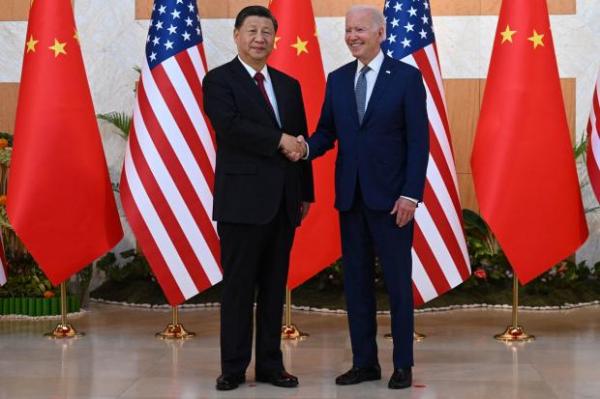
President Biden and Chinese leader Xi Jinping shake hands before a meeting of the Group of 20 in Bali, Indonesia, on Nov. 14, 2022. (Alex Brandon/AP)
The world is a tense place these days, with Europe consumed by its biggest land war since 1945 and conflict continuing to convulse the Middle East. These tensions would pale into insignificance, however, if a third arena were to erupt — in Asia, involving the United States and China. Those tensions have in fact calmed down in recent months as both Washington and Beijing have sought to stabilize their relationship. But there are now cries in Washington to change that.
In an essay in Foreign Affairs, Matt Pottinger and Mike Gallagher argue that the United States should adopt a Cold War-style containment policy toward China, a strategy whose goal should be a victory that would encourage the Chinese people to “explore new models of development and governance.” Pottinger acknowledged on my CNN show last week that “an effective U.S. strategy might naturally lead to some form of regime collapse.” Pottinger was Donald Trump’s senior-most aide on China policy, and Gallagher, a former congressman, chaired the House select committee on China. Their views will likely shape the next Republican administration.
Pottinger and Gallagher argue that President Biden’s strategy — managing competition with China — does not go nearly far enough. The authors accuse the Biden administration of pursuing a 1970s-style détente policy toward China when it should be pursuing a 1980s-style Reaganite policy designed to push Beijing to the brink. According to them, we should welcome more friction and tension with China.
This is an important essay because it lays out clearly the alternative strategy being proposed by some on the right. By putting their cards on the table, Pottinger and Gallagher help us understand the reckless, dangerous and utterly impractical nature of their preferred policy.
China today bears little resemblance to the Soviet Union of the 1970s and 1980s. The Soviet Union was an unnatural empire, cobbled together after World War II, with a decrepit economic model that had started to fail by the mid-1970s. China is the world’s second-largest economy and largest trading nation. Unlike the Soviet Union’s totally state-owned economy, China has a mixture of private and public sector. Ninety-two percent of China’s exports come from a vibrant private sector, including 42 percent from firms with foreign investors. Despite its recent troubles, the Chinese economy is still growing at around 5 percent and, because of its size, is likely to stay the world’s second-most important economy for decades.
The Soviet Union was an isolated economy, whereas China is deeply integrated into the global system. Trade between the United States and the Soviet Union peaked at several billion dollars a year. China and the United States do that much trade every few days. The Soviet Union’s gross domestic product was around $3.2 trillion at its peak, roughly 7.5 percent of world GDP. Today, China’s GDP is about 20 percent of global GDP.
Most fundamentally, the Soviet Union was largely a natural resource economy — a Siberian Saudi Arabia — deriving much of its growth from extractive industries such as oil, gas, coal, nickel and aluminum. China is a diversified manufacturing powerhouse with an increasingly sophisticated information technology industry that is second only to the United States. In fact, looking back, it’s clear that in the 1970s, the Soviet economy had stalled, before receiving a last lifeline when global oil prices quadrupled. By the 1980s, oil prices had collapsed — and then so did the Soviet Union.
Were the United States to embark on a policy of containment, it would likely find itself alone. China is the largest trading partner of over 120 countries around the world, far more than the United States can claim. And most of these countries are eager to maintain good ties with Beijing. Eighty-two percent of Nigerians, for example, say Chinese investment has been a boon to their economy. Even European nations — America’s closest allies — have made clear that they view China as much as a partner as they do a rival. French President Emmanuel Macron noted last year that even in the worst-case situation of a conflict over Taiwan, Europe should be careful not to mimic U.S. hostility toward Beijing. And while he was criticized for those remarks, as one German businessman noted to me, “We all privately believe what Macron said publicly.” German Chancellor Olaf Scholz was in China last month, hoping to deepen economic ties between the two countries.
American strategies of regime change have rarely worked. Think of Cuba, Venezuela, North Korea, Iraq and Afghanistan. And they are unlikely to work this time, especially in a country like China, where the regime is broadly credited with bringing major economic progress for its people. After decades of poverty and misery, average incomes in China grew ninefold from 1978 to 2015.
The current bellicosity on the right reminds me of the growing demands for regime change against Iraq two decades ago. But this would be even worse. Because of China’s size and engagement with the world, a strategy of containment and overthrow would take the United States down a hair-raising path. Sustained confrontation would unravel the global economy, risk isolating the United States, and raise the odds of a world war over Taiwan. It is worth some sober reflection before embarking down this road.






